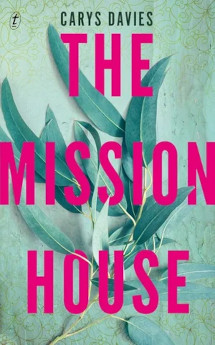The mission house by Carys Davies

Text Publishing, 2020. ISBN: 9781922330635.
(Age: Adult) Highly recommended. I enjoyed this book from the first
page; I loved how scenes in India were conjured with just a few deft
words, and the unusual characters drew me in. I found myself reading
more and more slowly because while I wanted to get to the heart of
the mystery, I was enjoying the story so much I didn't want to come
to the end. The writing style is sparse but with just the right
words dropped into a sentence to convey a place and a feeling. And
there is a gentle vein of humour that made me smile but still
empathise with the anxieties that torment the main character Hilary
Byrd.
Hilary Byrd is a man too much in his own mind, he has come to India
to find himself again following a prolonged period of depression,
possibly a nervous breakdown, in his past life as a librarian in the
UK. A chance encounter on the train escaping from the heat of the
plains to the coolness of the hill stations of south India leads him
to accept an invitation from the Padre to stay in the mission house
while the young missionary, Henry Page, is overseas. And it turns
out to be just what Byrd needs - cool, peaceful, undemanding, and
with a small circle of people that he can get to know gradually on
his own terms: the kindly Padre himself, the orphan Priscilla with
the limp and missing thumbs, and the auto driver Jamshed, uncle to
another orphaned young person, Ravi the hopeful Country and Western
singer complete with guitar and horse.
Byrd seems to have finally found a place where he feels like there
is some meaning to his life, some sense of fulfilment, and where he
feels comfortable as his friendships grow. But early on, the author
Carys Davies lets us know that something does go wrong, with just
the side mention of a police statement and witness recollections.
It's enough to alert us that Byrd may be deluded and there is some
kind of tragedy ahead.
I found this to be a really intriguing story of the fragility of
people's hopes and dreams, the unsaid words, the good intentions,
the mistakes and misunderstandings, set within the context of a
country with a history of oppression and simmering conflict. The
takeaway in the end? - probably the treasure of kindness and
friendship in unexpected places and the personal rewards in giving
to others. It is an unusual story of small lives impacted by larger
political events.
Themes: Anxiety, Depression, Loneliness, Post-colonial India,
Friendship, Relationships.
Helen Eddy